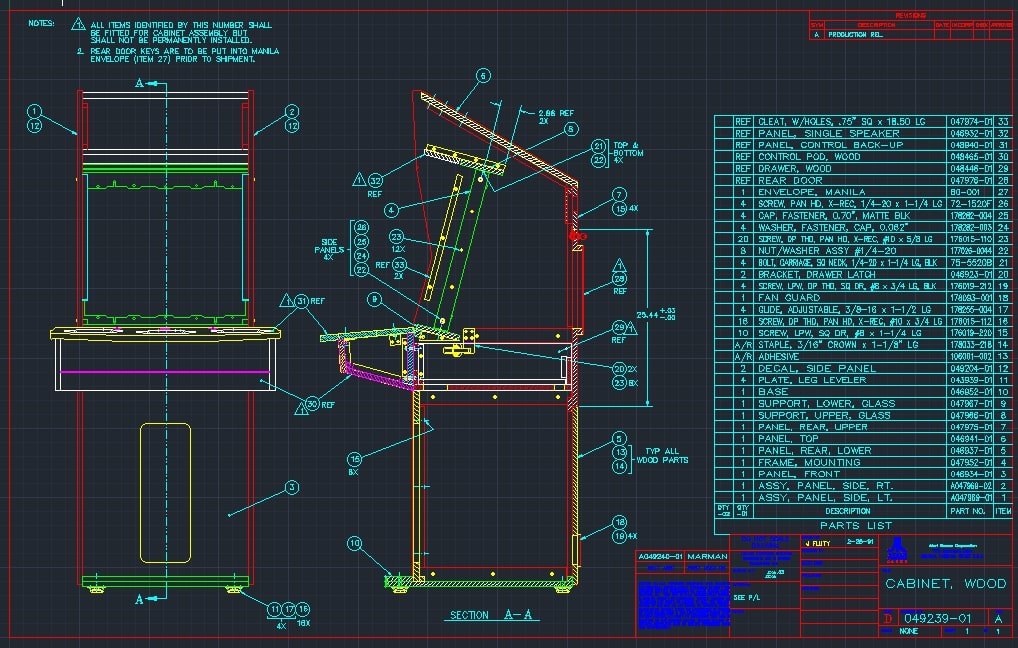ICHEG has acquired a massive collection of materials chronicling the history of Atari’s pioneering video arcade and pinball machine divisions from 1972 to 1999. The collection represents the largest and most comprehensive assemblage of archival records and other documentary items related to Atari’s coin-operated games anywhere in the world.

I first encountered Atari’s video arcade games at a local arcade where my brother and I spent many hours playing classic vector graphic space shooters like Asteroids (1979) and Star Wars (1983). For us, and millions of people during the 1970s and 1980s, Atari was synonymous with video games. Indeed, Atari, Inc. founders Nolan Bushnell and Ted Dabney pioneered coin-operated video games with their creation of Nutting Associates’ Computer Space (1971).
The Strong’s newly acquired Atari Coin-op Divisions Collection, 1972–1999 documents the design, production, and marketing of nearly every Atari coin-operated game from Atari, Inc.’s (1972-1984) first game, Pong (1972), to Atari Games’s (1984-1999) last arcade machine, San Francisco Rush 2049 (1999). This singular collection includes more than 3,000 pieces of one-of-a-kind artwork, design documents, hand-drawn assembly design sketches, and company photographs; nearly 2,800 videos of television commercials, game demos, focus groups, and company celebrations; and thousands of pages of corporate records documenting industry research and game production. Together, these reveal the workings of one of the most significant companies in recent history and illuminate its role in the growth of the video game industry.
Like millions of gamers, my brother and I anxiously awaited the next great Atari arcade game without ever considering all the work that went into designing and manufacturing popular games such as Asteroids, Missile Command (1980), and Paperboy (1985). As this collection demonstrates, Atari’s games were products of countless hours spent brainstorming, researching, debating, designing, testing, manufacturing, and marketing. For instance, one series of documents in the collection illustrate how games such as “Asteroids II,” later titled Asteroids Deluxe (1981) came out of company planning sessions that included concepts like linking two Battlezone (1980) cabinets together to encourage competitive play. In addition, design documents and artwork illustrate how engineers and designers constructed and added graphics to arcade cabinets. Individual game binders contain memos, design notes, manufacturing cost estimates, proposed production schedules, and play test results that document the entire game production process.

Few games made the leap from play testing to full production. For example, in 1982 Asteroids and Centipede (1981) co-creator Ed Logg designed a Berserk (1980) and Pac-Man (1980)—inspired maze shooter game called “Maze Invaders.” Unfortunately, the game did not test well with players, and the company halted “Maze Invaders” before it could go into full production. Today, only two units are known to exist, and one of them is included in The Atari Coin-op Divisions Collection, 1972–1999 of coin-op materials.
The company marketed the few games that made it through successful player testing to distributors and operators who would place them in arcade and street locations with the hopes of attracting eager players. The collection includes records of focus group and market research, photographs from photo shoots, print advertising artwork and proofs, television commercial storyboards, and video of commercials, all of which document how Atari studied and responded to the player market, crafted advertising visuals and narratives, and ultimately sold its arcade games to potential buyers and players. The Atari Coin-Op Divisions Collection, 1972–1999 complements ICHEG’s collection of more than 60 original Atari arcade video games and pinball machines, rare Home Pong and Atari 2600 chip plots, other design documents, and hundreds of Atari console and computer games. The collection will provide researchers studying the history of Atari, the arcade, coin-operated games, or the video game industry with many avenues to explore.


